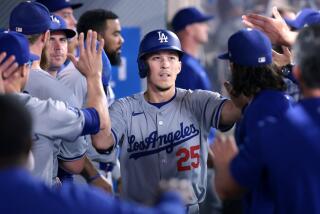Playing a Child’s Game for Keeps
A few weeks ago in Huntington Beach, a concerned parent rushed out of the bleachers during a Senior League baseball game and allegedly cold-cocked a 16-year-old umpire after a call that allowed his son’s opposing team to score a run.
Recently in El Centro, the final eight games of a Little League season were canceled after another so-called adult jumped out of the stands and threatened an umpire with a knife following a controversial call in a game.
The ballplayers in question here were 8-year-olds.
And you thought kids were under pressure to learn their times tables.
You hear stories like these and realize that nothing ever really changes, that too often the games of children are still played for adults. It was that way 20 years ago and probably 40 before that.
We all knew kids in Little League or Pop Warner who kept one eye on the ball and one on the stands. We’ve heard stories of sons who played $20-a-homer with their dads. We all felt the aching tug in our stomachs when the bases were loaded and we were at bat.
It can be serious business, being a kid, especially for the ones who don’t want to be out there in the first place.
Whenever I hear stories about kids and parents and sports, I can’t help but think of a boy named Harold, a name that means nothing to you but everything to me.
Sometimes I’ll think of him when passing a ballfield.
Harold was a teammate of mine on a midget Pop Warner team in North Orange County. We were eighth-graders. It would be a lie to say that I knew him well or even liked him.
All I know is that Harold had no business playing football.
I didn’t know his parents and can’t begin to question their motives. I can’t tell you why or even if they pushed their son out of the car every day for practice. As an eighth-grader with glowing red hair and swizzle sticks for legs, understand that I had my own problems.
What I remember most about Harold is the sight of him crying. He did most every day.
Harold was a bona fide clod. His uniform hung on him like an oversized suit. He made this clanking sound when he ran, shoulder pads flapping underneath his jersey. Harold’s pants drooped in the seat and his thigh pads roamed around his upper legs, protecting everything but his thighs.
Tucked inside his helmet, Harold sort of looked like a puffer fish. When he bit into his mouthpiece, his eyes popped opened wide and his cheeks filled with air.
When we ran wind sprints, Harold cried. When we crawled on all fours up the dirt hill behind our practice field, Harold cried.
When we had tackling drills, Harold cried even more.
We, of course, handled Harold with all the tact of eighth-graders. We knocked him around like a pinball. He was an easy target and no matter how bad you were, you always looked better after tackling Harold.
When Harold cried, we laughed. With collective wit we reminded him daily that crying was for babies, not for ones so close to puberty.
But it all changed one day.
There’s a tackling drill in football where two players lie flat on their backs about 10 yards apart. One player holds a ball. On the command of a whistle, the players jump to their feet and run toward each other like two locomotives locked on the same track.
I had a good view when Harold and a guy named Jim took their places on the ground. I was next in line to tackle.
Harold held the ball against his stomach. The whistle blew and Harold ran toward Jim.
Jim hit him hard and clean, helmet to helmet. We all cheered.
Harold didn’t. Of course, he cried. Our coach ordered Harold to his feet and told him a few laps would shake the cobwebs from his head.
Harold took two steps and dropped to the ground.
Our coach cradled Harold in his arms but he wouldn’t move. His eyes were wide open but they refused to blink.
I had never seen anyone die before.
We were ordered to run circles around the field for no other reason than to keep us from staring. We ran for what seemed like hours, watching as they finally carried Harold off the field to the hospital.
The next day, someone explained to us something about how a blood clot had formed in Harold’s brain and that the blow to the head was fatal.
Jim wasn’t there to hear it.
We gathered as a team and, for some reason, voted to continue the season. Some of our mothers begged us to quit, but the only one who did was Jim.
We went to the funeral and went on with our lives.
But most of us will never forget what happened that day.
I hope I remember long enough to tell a son of mine.
Recently, I drove past my old Little League field and watched as one minor leaguer took his position in right field. I wondered if he really wanted to be there.
Sometimes I’ll think of Harold and wonder what might have become of him. He might have been a great lawyer or an accountant. Maybe a space scientist.
We all knew he couldn’t play football. But, then again, he never said he could.



